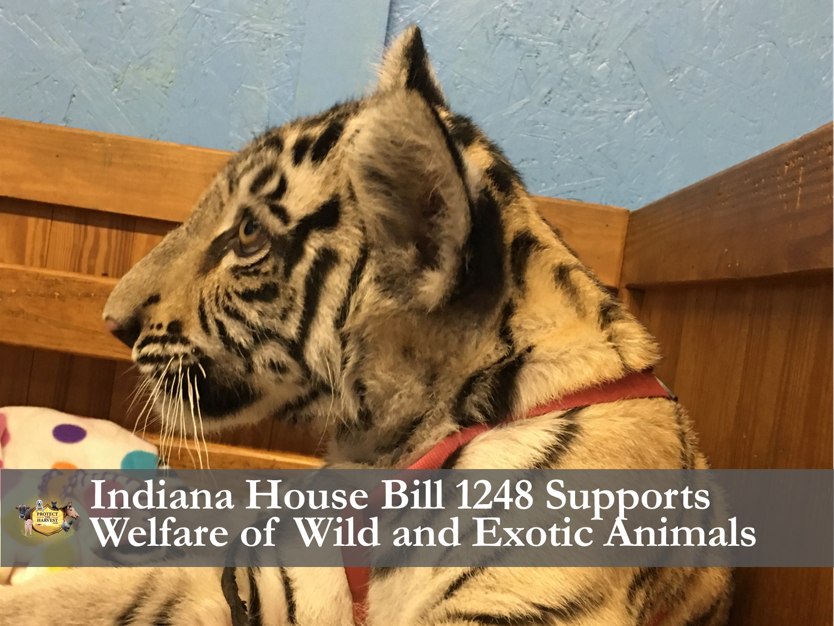
By Jaclyn Krymowski for Protect The Harvest
The bipartisan Indiana House Bill 1248 was recently signed into law by Governor Eric Holcomb on March 3rd. First introduced by Representative David Abbot, this legislation will prohibit owners of specified animals (primarily exotic apex predators) from allowing the public to come into direct contact or in close proximity to them.
This common-sense legislation is directed towards ending the practices of “cub petting” that is done at some private zoos and preserves. Cub petting activities allow the public to interact with wild animals directly.
Cub petting and similar activities have the potential to be dangerous to the public. These activities also put the animals – which are wild, not domesticated – in a position that can be threatening to their natural behaviors and welfare. House Bill 1248 follows the recent closing of a facility shut down by Indiana state officials, which offered cub petting to its visitors. In addition to cub petting, the facility also faced allegations of over 120 Animal Welfare Act violations.
What’s in the Bill?
In addition to the cub petting restrictions, it also requires that any person owning a “specified animal” have a license issued by the U.S. Department of Agriculture as a dealer, breeder, or exhibitor of that animal. The new law does not prohibit the ownership of exotic animals.
The official language reads as follows:
“Direct contact with specified animals. Prohibits a person that owns or possesses a specified animal from allowing a member of the public to come into direct contact, or enter into a proximity that allows for or permits direct contact, with the specified animal. Prohibits the department of natural resources from adopting a rule to designate additional specified animals. Requires that a person who owns a specified animal must have a commercial animal dealer, breeder, or exhibitor’s license issued by the United States Department of Agriculture. Provides that a violation of the law is a Class B infraction. Excludes from the substance of the bill physical contact or proximity between certain persons and a specified animal.”
A Positive Win for Animal Welfare
In the case of wild exotic animals, responsible ownership is of the utmost importance. Unlike domesticated species, wild animals do not have years’ worth of selective breeding and human interaction. Instead, they have their natural-born instincts which cause flight, fight, and predatory behaviors to be easily and naturally directed toward humans.
Legislation like HB 1248 represents good animal welfare as it empowers the USDA to oversee responsible exotic ownership while eliminating dangerous situations contrary to animal welfare and public safety. Protect The Harvest commends this type of common-sense legislation that promotes animal welfare and public safety, without removing the rights of the animal owners.
The Public Needs Wildlife Exposure
Public experience and education involving exotic and otherwise wild animals are positive for both visitors and animals. It inspires young minds to work in the fields of ecology, biology, and animal husbandry while showcasing the need to preserve our natural resources.
There is no replacement for real-life, in-person experiences with these animals. Zoos, aquariums, and preserves provide the optimal venue to do this. They prioritize good management practices that uphold animal welfare and they also allow a safe environment for the public to experience wildlife in person instead of only via video and photographs.
Most zoos and aquariums have breeding and rehabilitation programs to help preserve species in a way that would not happen in their natural environment.
As an organization which supports both animal ownership and animal welfare, we believe Indiana House Bill 1248 is a positive step to protect animal owners, wild animals, and the public.
Links for Information About Zoos and Preserves
Zoos Offer a Valuable Service HERE
What You Need to Know – Zoos Are A Lifeline to Conservation HERE
Wildlife World Zoo Aquarium and Safari Park HERE
White Rhinos Endangered Species Breeding HERE
We Must Stand United – Performing Animals HERE


